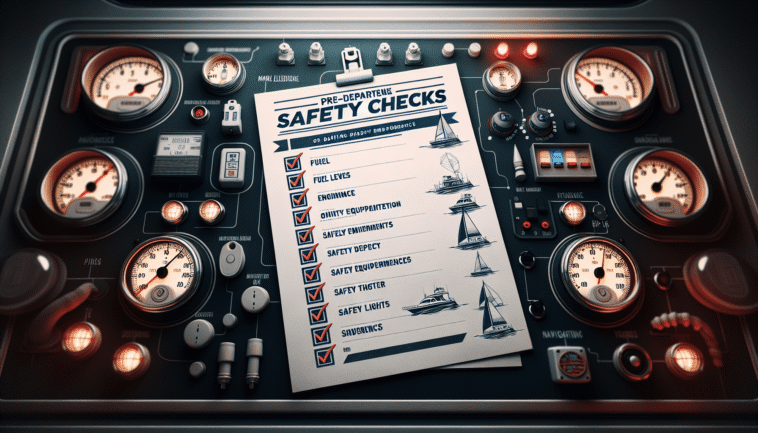What Practices Reduce The Risk Of Dangerous Boating Emergencies?
Are you a boating enthusiast who wants to ensure a safe and enjoyable experience every time you hit the water? Understanding the practices that reduce the risk of dangerous boating emergencies is essential for your safety and the safety of others. By implementing these practices, you can minimize the chances of encountering a serious emergency on the water.
Pre-Departure Safety Checks
Before you head out on the water, it’s crucial to perform pre-departure safety checks to ensure that your boat is in optimal condition. Check the following items to reduce the risk of emergencies:
- Fuel Levels: Make sure you have enough fuel for your planned trip and some extra for emergencies.
- Engine Function: Test the engine to ensure it starts smoothly and runs properly.
- Navigation Lights: Check that all navigation lights are working correctly for safe night boating.
- Safety Equipment: Ensure you have all the necessary safety equipment on board, such as life jackets, flares, and a first aid kit.
By conducting thorough pre-departure safety checks, you can identify any potential issues before they escalate into emergencies.
Proper Boat Maintenance
Regular maintenance is key to preventing breakdowns and emergencies while out on the water. Make sure to:
- Check for Leaks: Inspect the hull for any signs of damage or leaks and repair them promptly.
- Maintain Electrical Components: Ensure that all electrical components, such as batteries and wiring, are functioning correctly.
- Monitor Engine Performance: Schedule routine maintenance for your engine to keep it running smoothly.
- Clean and Store Equipment: Properly clean and store all equipment to prevent deterioration and ensure it’s ready for use.
By maintaining your boat properly, you reduce the risk of sudden mechanical failures that could lead to emergencies.
Weather Monitoring
Weather conditions can quickly change while you’re out on the water, potentially putting you in danger. Stay safe by:
- Checking Weather Forecasts: Before heading out, check the weather forecast and monitor any updates regularly.
- Signs of Changing Weather: Watch for signs of changing weather, such as dark clouds or sudden winds, and head back to shore if necessary.
- Emergency Procedures: Know the emergency procedures for different weather conditions, such as storms or strong winds.
Being aware of weather conditions and knowing how to respond can help you avoid dangerous situations while boating.
Proper Communication
Effective communication is vital for ensuring safety on the water. Be sure to:
- Check Your Radio: Test your radio equipment before departure to ensure it’s working correctly.
- Know Emergency Contact Numbers: Have important contact numbers, such as emergency services and marine assistance, saved in your phone.
- Use Distress Signals: Familiarize yourself with distress signals, such as waving arms or flashing lights, to signal for help if needed.
By having proper communication tools and protocols in place, you can quickly address emergencies and call for help when necessary.
Safe Navigation and Operation
Proper navigation and operation of your boat are essential for avoiding accidents and emergencies. Remember to:
- Follow Boating Rules: Adhere to all boating rules and regulations to prevent collisions and accidents.
- Maintain a Safe Speed: Operate your boat at a safe speed, especially in crowded areas or rough waters.
- Avoid Distractions: Stay focused on navigating your boat and avoid distractions, such as using your phone or socializing.
- Keep a Lookout: Assign someone to keep a lookout for obstacles or other boats while you navigate.
By practicing safe navigation and operation techniques, you can reduce the risk of accidents and emergencies on the water.
Emergency Preparedness
Despite your best efforts to prevent emergencies, it’s essential to be prepared for unexpected situations. Make sure to:
- Have an Emergency Plan: Create a detailed emergency plan that outlines what to do in case of different emergencies, such as a fire or a collision.
- Practice Emergency Scenarios: Conduct drills with your passengers to practice emergency procedures and familiarize everyone with the proper protocols.
- Carry a Survival Kit: Keep a survival kit on board with essential items such as food, water, a flashlight, and blankets.
- Stay Calm and Composed: In the event of an emergency, stay calm and composed to make rational decisions and communicate effectively.
Being prepared for emergencies can make all the difference in ensuring your safety and the safety of others on your boat.
Conclusion
By implementing these practices, you can significantly reduce the risk of dangerous boating emergencies and enjoy a safe and pleasant boating experience. Remember to prioritize safety, stay informed about weather conditions, maintain your boat properly, and be prepared for emergencies. Your commitment to following best practices will contribute to a safer boating environment for everyone. Happy boating!





